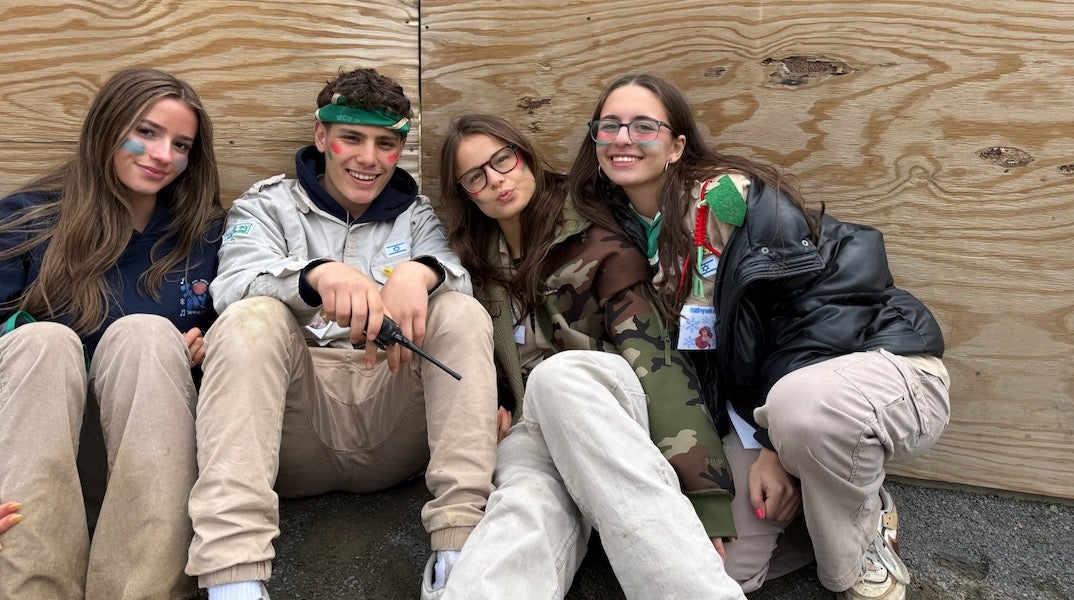This article was produced as part of the New York Jewish Week’s Teen Journalism Fellowship, a program that works with Jewish teens around New York City to report on issues that affect their lives.
As a high school senior, the stress of college applications, homework and the looming end of childhood leaves me constantly waiting for Sundays. That’s the day I get to put on my khaki Tzofim, or Israeli Scouts, uniform — covered with pins, patches and signatures — and head to Manhattan’s East Side.
There, in a rented room in a Catholic school, is where I feel most grounded. There, I’m surrounded by people that understand the duality of being both American and Israeli, something that my born-and-raised American friends simply couldn’t understand. When I’m at a Tzofim meeting, surrounded by Israeli-American teens from across the city, the complexity of that dual identity doesn’t seem so complex.
Tzofim has been my refuge since shortly after the horrific events of Oct. 7, 2023. One bright November morning, just a few weeks after the attack, I was in my AP World History class, discussing nationalities and the role they play in history. My teacher decided to pick me as an example, pointing out to the class that my nationality is Israeli.
My classmates glared at me with newfound judgment. Suddenly, the labels I had always cherished — Israeli, Zionist, Jew — were no longer affirmations of pride. Instead, they felt like accusations, heavy with opinions and suspicion.
For the first time in my seven years of living in New York, I felt completely alone.
Two weeks later, I attended my first Tzofim activity. The meeting took place in a modest community space near Union Square, the room was filled with chatter, music and rows of teens in uniforms just like mine. Surrounded by peers who had similar fears about being judged for their Jewish and Israeli identities, I felt understood. I didn’t have to explain or defend who I was.
Founded in Israel in 1919 and brought to the United States more than 25 years ago, the Tzofim is a youth-led movement modeled loosely on the World Scouting Movement, but with a focus on Israeli culture and Jewish identity. It serves kids and teens ages 7 through 18 and emphasizes leadership, service and community.
Our New York chapter, Shevet Tapuach, meets weekly for programs that mix cultural education, team-building activities and discussions about Jewish identity and current events. Teens take on leadership roles: guiding younger scouts, organizing events and shaping the direction of the chapter.
After Oct. 7, participation in Shevet Tapuach surged — membership grew from 180 to more than 330 participants, according to our chapter head, Michal Poran. The teen division alone nearly doubled, from 54 to 95. What was once one of the smallest chapters in the U.S. became a thriving hub of Jewish teen life in New York.
This growth reflected a larger shift in post-Oct. 7 Jewish life: Many teens who had once felt only loosely connected to their Jewish or Israeli identity began seeking out safe spaces where they could feel seen and supported. In response, our chapter opened its doors more widely. What had previously been an Israeli-centered environment became a place where Jewish teens of all backgrounds could find belonging.
Poran called this shift a “rebranding,” sparked by the war in Israel. “We wanted to make this a community and a home for all Jews, a place to feel included, even if you’re not Israeli,” she told me.
Emma Navoth, an 18-year-old leader who has been in Tzofim since second grade, told me she’s watched the chapter transform. “So many teens who never thought about joining before are coming now,” she said. “People want a place where they feel safe and supported. For me, Tzofim has always been that, now it’s that for even more people.”
Another member, Liya Blinderman, explained that after Oct. 7, she realized that comfort couldn’t be found in the routines of school or casual hangouts with friends. What she needed was a community that understood what it felt like to wake up to news from Israel every morning, or to have family conversations constantly circle back to the war. “It became a meaningful outlet for me,” she told me. “A place where I could grow, connect, and give back. The support here isn’t just organizational, it’s deeply human.”
For these Jewish and Israeli teens in New York — myself included — the Scouts have become more than just an extracurricular activity. They’re an entry point into a longstanding tradition of leadership and resilience. Weekly meetings teach us not only about Israeli history and Jewish culture, but about standing strong in times of adversity.
As the new school year begins, I’m excited to see our group continue to grow — welcoming new members, planning community events, and finding new ways to speak up and support one another. For me, Tzofim isn’t just a reminder of who I am; it’s a way to shape who I want to become.
Jewish stories matter, and so does your support.




